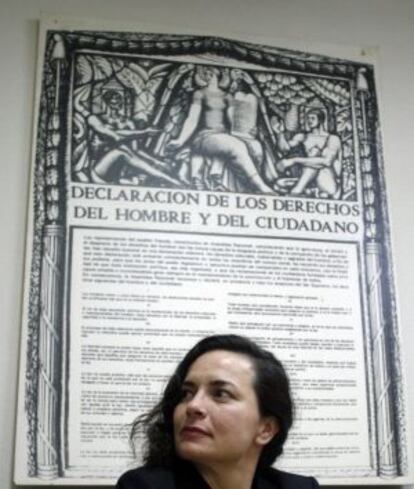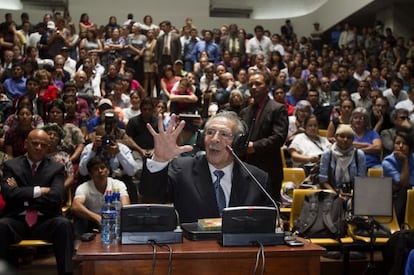“The genocidal master plan came earlier and Ríos Montt supplied the tactics”
Human rights lawyer Almudena Bernabéu has been involved in some key cases in Latin America

Almudena Bernabéu first visited Guatemala in June 2006. Then 34 years old, the Valencia-born lawyer had gone there to help prepare the case against the Central American country's former president, General José Efraín Ríos Montt, accused of overseeing a campaign of genocide against the indigenous Mayan population in the early 1980s.
Bernabéu, who has divided her time between Madrid and San Francisco since 1999 (she works at the Center for Justice and Accountability), had already been working on the case for two years after the Spanish High Court, which practices universal jurisdiction, and has pursued other notable human international rights cases, had taken it up.
On May 10, Ríos Montt became the first former Latin American head of state to be convicted of genocide and war crimes, and was sentenced to 80 years in prison. But less than two weeks later, the Guatemalan Constitutional Court overturned the ruling, ordering a new trial of the 86-year-old former dictator.
Bernabéu also worked on the case that proved the involvement of a former Salvadoran defense minister in the killing of six priests in 1989.
She is now working with the widow of Chilean folk singer Víctor Jara, who was murdered during the first days of the military coup led by General Augusto Pinochet, in September 1973. Joan Jara first requested an investigation into her husband's death in 1999. Late last year, Chilean Judge Juan Fuentes charged retired Colonel Mario Manríquez as the man who ordered the killing.
I was touched by the judge; her voice trembled as she read out the sentence"
A candidate for Time magazine's list of the 100 Most Influential People of 2012, Bernabéu found time to talk about her work while taking her annual vacation in Alicante earlier this summer.
Question. What were your first thoughts when you found out that Ríos Montt had been found guilty of genocide?
Answer. I was at home, on my own. Which isn't right - I should have been with people. I cried. I was very touched by the words of the judge who oversaw the case, Yasmín Barrios, whose voice trembled as she read out the sentence. It just seemed so human. I watched it on a computer thanks to an NGO in Guatemala that streamed it live. I was choked with emotion. It was the first time that we had won. Normally, you spend years and years investigating cases, speaking to the victims, but there are no sentences. We try not to get our hopes up, but at the same time we dream of bringing about justice. Even though this hadn't happened in Madrid, but in Guatemala, I felt as though I personally had won, I felt the pride of Mother Courage, of having produced a good case. I began to receive messages, and that was even more emotional. At the same time, I felt that it wasn't me that people should be congratulating, but I had been part of it. I felt very proud.
Q. More than 250,000 people are estimated to have died between 1960 and 1983, and hundreds of thousands more displaced. Ríos Montt was in power for just eighteen months, and was found guilty of the murders of just over 1,000 people...
A. Yes, he was in power for just a little time, but we have evidence that the period of his presidency was the worst.
Ríos Montt was young and powerful; he is a fanatic, a man of war"
Q. Why was his time in office the worst? Was that down to a personal decision of his?
A. That is a very good question. The plan to kill indigenous people, the idea of destroying the guerrillas by liquidating the people - the master plan - in reality came earlier. The Guatemalans would say that it really began during the colonial era. But it was during the presidency of Lucas García [1978-1982] that the military strategy was defined. Then came the tactics, which were carried out by Ríos Montt. He took power in a coup. He was young and powerful; he is a fanatic, a man of war. They say he is a good soldier.
Q. What is he like as a person?
A. Sinister. He is an attractive man, a white Guatemalan; elegant up to a point: he's 86, but always stands straight. I think he's mad, in the strict sense of the word. He is a religious fanatic. He hates Catholicism and the Catholics. He is a protestant, along the lines of the Mormons and the Evangelists in the United States. He belongs to the Evangelical Church of the Word, which is among the craziest. Ironically, and this is what I don't understand, it was set up in the summer of love, in 1967, or 1968, by people who became known as the Jesus freaks. They used to take ayahuasca [an Amazonian hallucinogenic]. But it later developed into a far-right group. There are still some groups who maintain the idea of a collective religion, and who are more progressive. But there are also these groups that are increasingly radical, particularly in the north of California, and that are becoming part of the fanatical right. Ríos Montt is part of the latter...
Q. What did he do after seizing power?
Ríos Montt hates Catholicism, and the Catholics. He is a religious fanatic"
A. He implemented the plans that the previous regime had prepared. He believed, and it makes your hair stand on end, that the army was being run by a bunch of lazy good-for-nothings who should have got on with the scorched-earth policy that had been agreed. He was proud of what he did.
Q. He's proud of it?
A. Absolutely, it's his magnum opus.
Q. Including murdering people?
A. He says that his goal was never to kill people. At the same time, he believed that the only way to destroy the guerrilla was to destroy the people. The people don't have a face, or an age, or gender.
I have work colleagues who say they still face racism in the White House"
Q. Is that what he said at his trial?
A. Yes, yes. They were simply people, lots of people, just like a spider's web is in the way and you brush it aside; as though they were branches in the way that you have to cut aside to make a path.
Q. And an estimated 100,000 women raped, a third of them girls.
A. I still find that hard to deal with.
Q. The journalist John Carlin says that in reality, the Ríos Montt regime was worse than anything South Africa's apartheid system ever came up with.
We have seen members of Chile's junta tried, but they have all walked free"
A. Oh yes, undoubtedly. Much worse.
Q. In historical terms, what would you compare it to?
A. With the system of slavery in the United States. The racism of apartheid was colonialist. But the racism of the United States is a political decision to convert another human being, solely on the basis of their skin, into somebody who is expendable, somebody who is dirt, a slave, and US society still hasn't recovered from that policy. Today, still, I have work colleagues, close to President Obama, who tell me that the biggest problem they face every day in the White House is racism.
Q. This happens within the Obama administration?
A. A lot of whites cannot stand the idea that a black man is president. For me, that is the comparison with Guatemala. Guatemala is a society that has always been made up of people of two colors, or two origins: mixed race, and native Guatemalans. A political decision was made long ago that the indigenous people were inferior, and it remains so today. I think it is harder to change that kind of system than one like apartheid, which is imposed from the outside. It is horrible the way that in Guatemala the country has interiorized the submission imposed by colonialism. Racism in Guatemala runs to the core of society; I would say much more than in South Africa, although I may be talking nonsense, because I don't know South Africa...
Dedication to just causes
- Almudena Bernabéu says that she originally wanted to be an investigating magistrate when she began her law degree. As a student, she wanted to dispense justice, until she realized that she preferred defending just causes.
- She has been living in San Francisco for more than 14 years. Her home is close to her work, and she prefers moving around the city by bike.
- She eats at work, saying that if she goes home, she ends up having a siesta and giving in to laziness. At night she spends her time looking after her 16-month-old baby, cooking and enjoying a good glass of red wine.
Q. More than 700 women were murdered in Guatemala [population 14 million]
in 2012, many of them raped and tortured first. Only two percent of these cases ever come to court. It's as though the violence of the dictatorship had left a permanent mark on society...
A. Yes, I think that is the case. The use of depraved violence is a consequence of the use of violence during the conflict. A human life isn't worth much, even if that sounds like a cliché. Women were an instrument of the war: they were raped in their homes and raped in barracks. Soldiers were trained to rape. The same pattern repeated itself when the soldiers went into a village: all the women were taken to the church with the children; all the men to the town hall. The women were raped, always in front of their children, girls were raped, some would be murdered. The men were executed, but not the boys, and they were thrown into a mass grave. We know this happened because the children have told us. I have had so many clients that have told me how their mother was raped in front of them. They even raped old women. It was an unimaginable level of depravity. There is a direct relationship between what happened, and the failure to bring those responsible to justice, and that is why the violence continues.
Q. You have spent a lot of time in Guatemala. It must have been hard to hear people's testimony.
A. It is, but at the same time it drives you on. If I were able to meet with some of these victims every month I would be a better lawyer.
Q. Why?
A. Because it keeps you grounded. I am guilty of all the mortal sins, but there are two in particular: I don't know if it is laziness or I am just lax, but sometimes I have to accept that I really don't want to call a client. It is emotionally draining; it requires energy I have to find from somewhere. I have bad weeks, but as soon as I have been with them for 10 minutes, I realize that they give me energy. They are very strong people - much, much, stronger than me. These are wise people; the extreme experiences they have lived through have given them a profound sense of the practical. They are people who really put me in my place.
Q. How did you get involved in the investigation into the murder of Víctor Jara?

A. The family called me. We now seem to be making progress in Chile.
Q. What led to the investigation being reopened?
A. They have found the man who did it. It is now 40 years since Jara was killed. His wife and two daughters have been fighting to find the killers for many years. In recent years we have seen members of the military junta tried, but they have all walked free; this is what tends to happen in these countries. But now they have found the man who actually pulled the trigger; he lives in the United States, in Daytona, Florida. His name is Barrientos. Two soldiers were assigned to guard Jara [in the soccer stadium in Santiago de Chile, where he and thousands of others were held in the first days after the coup] and who have been identified as the killers.
Q. What do you plan to do?
A. Barrientos has already been called to testify by the Chilean courts. We are going to try to accomplish two things: on the one hand, bring a civil law suit against him in the United States, which I will organize; and on the other hand, work to get him extradited.
Q. What does this case mean to you?
A. My mother used to sing me his songs. I never thought that I would be involved in a case like this. In Chile, Víctor Jara is a kind of intellectual and cultural version of Che Guevara.
Q. Both your grandfathers were held in prison camps during and after the Spanish Civil War. You criticized what you see as Spain's failure to bring to justice those responsible for abuses, or to simply recognize the abuses that took place.
A. We have all had to make too many concessions, voluntarily and involuntarily. There has never been any kind of revolution over this. In my own family I have seen the attitude that says: "If I keep quiet and mind my own business, things will get better." People were so afraid that it was necessary to conform. At the same time, I am glad to see that people in Spain are finally getting angry about other issues, like corruption. It's as though the scales have fallen from our eyes. And when a society begins to see what is really going on, then things can get better.
Q. Do you think that other Latin American countries should follow Guatemala's lead in bringing those responsible for abuses during the years of dictatorship to justice?
A. Yes, and they will. My hope is that El Salvador will follow suit next, and that the case of the murdered Jesuits in 1982 will be the catalyst for that process. I'm not singing my own praises here, but to a large extent what happened in Guatemala was because we took the case to the High Court [in Spain]. But there were a lot of people involved. In the first place, Santiago Pedraz, the judge who oversaw the case, and in second place, if you like, La Almudena
[referring to herself], who is a real bore. And of course, without the Guatemalan people, we wouldn't have gotten anywhere.
Q. Is there any woman, or figure from history that has inspired you?
A. Not really. I have always wanted to be two women, neither of whom were anything like me. One was my great-grandmother, who loved riding and hunting. She was widowed at the age of 32, with nine children, and was then imprisoned for horse riding - for not riding sidesaddle. The other woman I always wanted to be like was Katherine Hepburn. In my family, the women were always housewives, but even as a young girl I liked the roles that Katherine Hepburn played, and I wanted to be like her. I was always impressed by women with strong voices. I remember figures like [leftist politician] Cristina Almeida.
Q. You used to stick up for other kids at school, in a very different Spain, the Spain of the 1970s. You were the daughter of a single mother. So did you have a sense of injustice from an early age?
A. I am the middle child of three. My sister, the youngest, was a very quiet child, introverted. She was a little overweight, and the other kids at school would pick on her. It broke my heart when they did that. I also have a cousin who it turned out was autistic, and in the 1970s kids thought he was a softie because he behaved differently; in my family we didn't know what autism was. It really tore me up when the other kids picked on him.
Q. And what are your hopes and dreams?
A. It probably sounds very prosaic, but my dream is to reconcile my two lives; I want to remain close to Spain without leaving San Francisco. After 15 years, I have grown used to the place. I would love to live in New York, which is closer to Madrid; I hope to move there soon. I would love to solve some really big cases, hit the news, to be the Father Christmas of human rights, to bring good news to people, to be able to say that we changed things, that we achieved something positive.








































